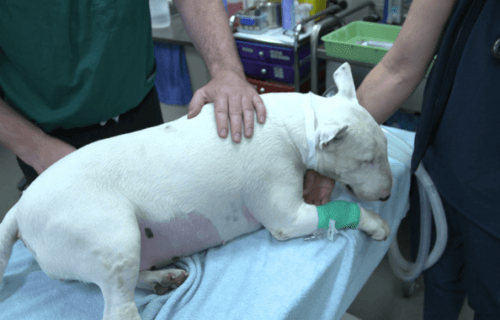NEDLANDS, Australia — A new immunotherapy gel could end the use of painful chemotherapy for childhood cancer patients. Researchers in Australia say a clinical trial involving pet dogs discovered that the substance successfully “mops up” cancer cells left behind after doctors surgically remove a tumor.
A team at Telethon Kids Institute says they’re aiming to use this gel to treat children with one of the most common childhood cancers, sarcoma. This is a cancer of the bones and soft tissues and is the third-most common cancer among kids. One in three patients die of the disease.
In a brand-new clinical trial, the team used the polymer-filled gel after removing sarcoma tumors from pet dogs. Doctors load this gel with immunotherapy drugs and apply it to the surgical site after extracting the tumor. Since chemotherapy can cause a number of painful side-effects — including fatigue, nausea, hair loss, and muscle aches — scientists are looking for ways to avoid this treatment option and still remove leftover cancer cells.
“The surgeon will try to remove as much tissue as possible, but often some cancer cells are left behind and the cancer just comes back,” says Associate Professor Joost Leisterhuis in a media release.
“With the immunotherapy gel, the surgeon would remove the tumor and apply the gel before closing the wound as they normally would. Then over time, the immunotherapy drugs get to work – drawing immune cells from all over the body and activating them at the site of the tumor to mop up any remaining cancer cells.”
Sarcoma is a common problem for dogs as well
After successful lab tests, doctors at Perth Vet Specialists are now treating pet dogs suffering from sarcomas.
“Surprisingly, sarcoma is one of the most common cancers in pet dogs and it presents exactly the same way as it does in children with sarcoma, which is a lump in the tissue of the muscle or bone,” Leisterhuis says.
“The treatment is also the same – to surgically remove the tumor. And often, as with children, some cells will remain and the cancer will come back. This trial is giving beloved family dogs access to cutting-edge treatments for their cancer, and their owners can know that they are playing a role in getting this treatment one step closer to helping kids with cancer.”
So far, seven dogs have received the gel treatment after cancer surgery, with veterinarians calling the results “overwhelmingly positive.”
“Sarcoma is actually more common in dogs than it is in people – we would see multiple patients per week with sarcoma and they can be fatal if they are left unchecked or spread into nearby organs,” according to Dr. Wyatt from Perth Vet Specialists.
“There doesn’t seem to be any problem in the healing of the dogs who’ve taken part in the trial so far, we seem to be getting a really good response from the gel. Everybody’s winning – the dogs are getting treatments they would otherwise not have access to and they’re also doing something that could ultimately help children with cancer.”
An all-natural cancer treatment
“The gel is made of long polymers which are natural and that are broken down by the body itself,” says Associate Professor Killugudi Swaminatha Iyer from the University of Western Australia.
“So for this treatment, the team has tagged on some immunotherapy to those long polymers which are then slowly these are released in the body and the polymers themselves are broken down.”
Prof. Lesterhuis notes that there have been few developments when it comes to sarcoma treatment over the last 30 years. This leads to doctors exposing children to high doses of toxic radiotherapy and chemotherapy.
“Immunotherapy is one of the most exciting developments in cancer treatments but so far it has not had much success in sarcoma treatment,” the researcher explains.
“This is a cruel disease and the life-long side effects that kids suffer from more traditional treatments include learning difficulties, infertility, speech and vision problems and even secondary cancers – where the treatments themselves cause new cancers to develop,” the researcher continues.
“Our dream in the end is that with these sorts of immunotherapies we can replace chemotherapy and radiotherapy all together. But at this stage I would see it as an addition, where we might be able to reduce some of the chemo or radiotherapy. We have to do better for these kids and their families.”
The team notes that a clinical trial involving children with sarcoma is still a few years away.

